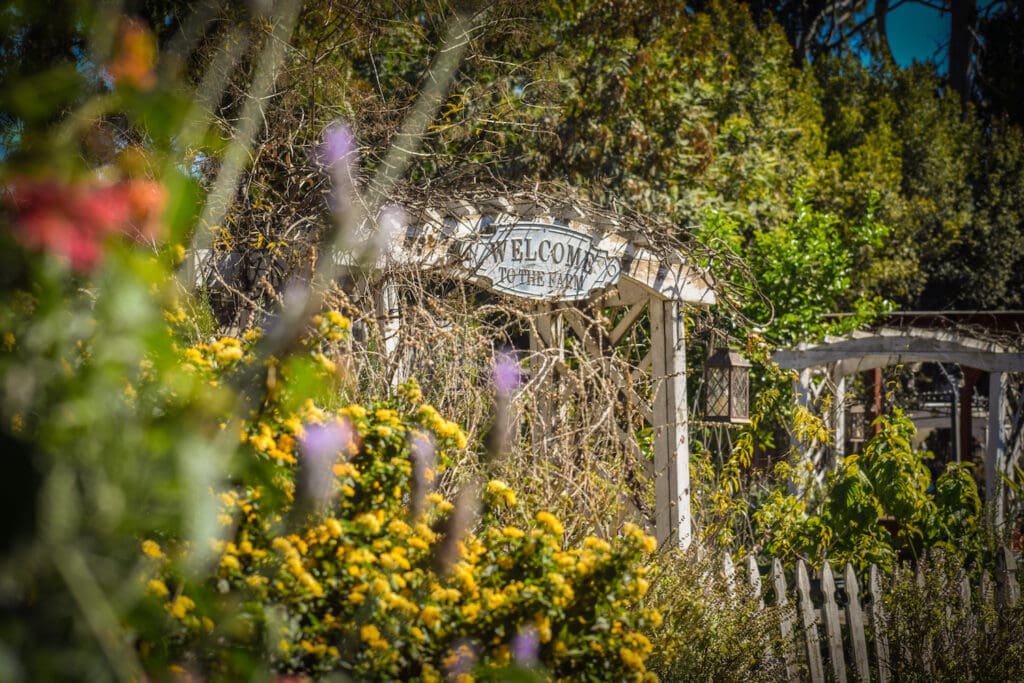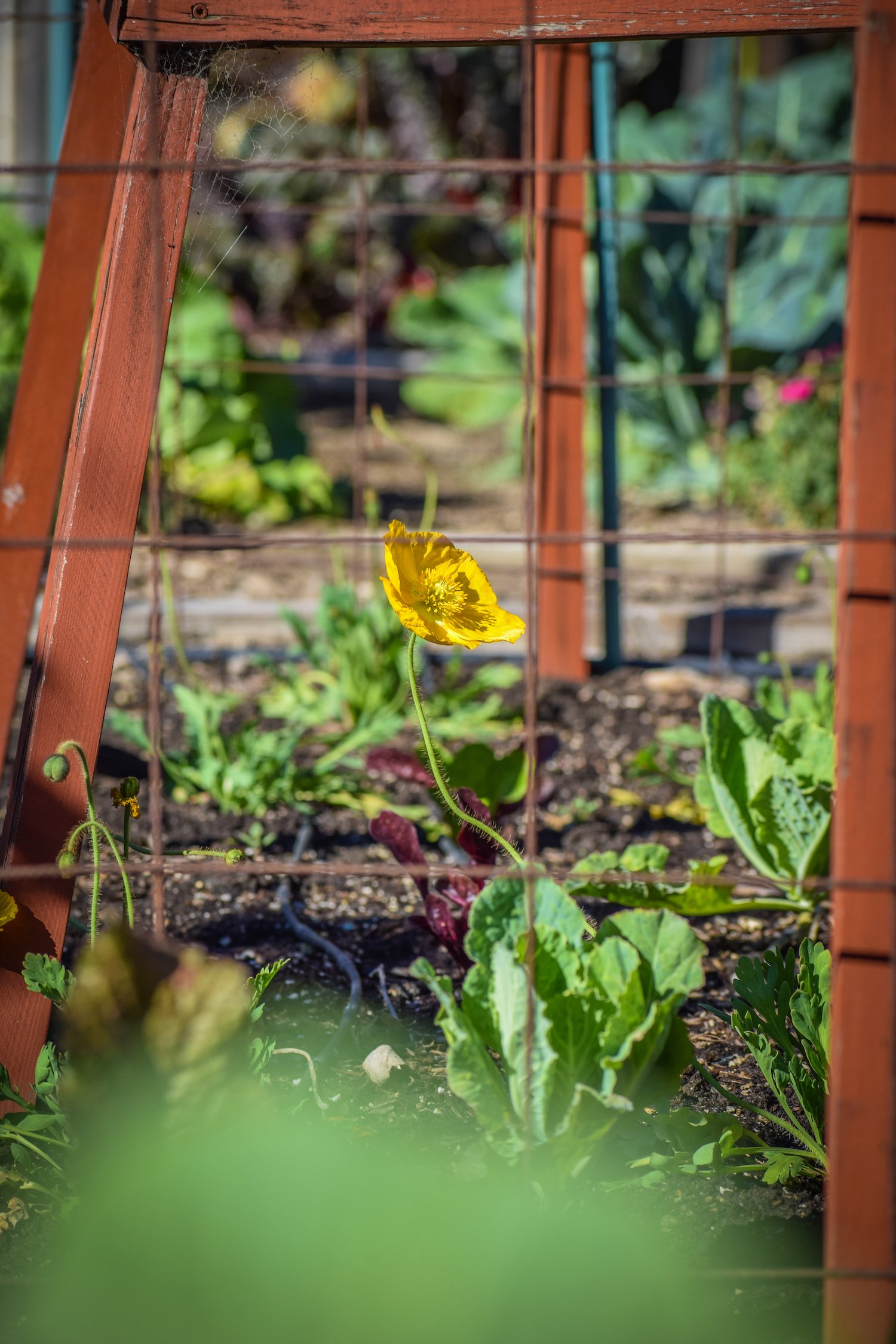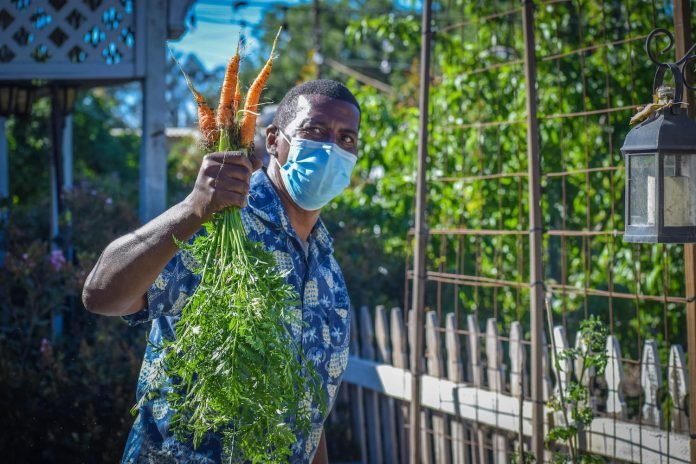It is a surreal dichotomy, especially in the urban landscape of our region, where nearly every aspect of our land has been dedicated to concrete and structures: The 91 Freeway, just where it meets the 710, sits high above as it passes over the Los Angeles River. And below, just north of it, a farm filled with glowing green dill, bright blood rhubarb, dots of white as camomile flowers bloom, heirloom tomatoes taking shape, carrots ready to be pulled, collards waiting to be braised, massive stocks of kale…
And yes, the occasional semi, hauling its cargo from the port, will have its horn cut through the air as it passes by—but, for the most part, it is shockingly quiet and peaceful. If anything, there is a hum of sorts from the outlier environment that is less interruptive than it is a form of white noise.

This is Organic Harvest Gardens, the tangible expression behind the sweat and love of its owner and caretaker, Chef Rod Dodd. It is impossible to separate the farm and its yields from Dodd himself—and it goes far beyond the obvious reason that the man, along with his trusted sister-in-farming Jackie Hunt—affectionately called “Miss Jackie” by those who know her presence well—made the harvest itself possible.
“We need to see each other colors, and celebrate that—that isn’t a question. But our allies are going to make mistakes and we must walk with them through that. What us older Black folk and the Black elders before us went through and witnessed was very real; we certainly aren’t naive. But they believed—and I still very much do—that love conquers all. That belief echoes through every part of this place for me.”
To understand Dodd’s love and his farm is to have a dinner at that very farm, to walk around and experience not just the farm’s growth but how that growth is turned into bread.It is at one of these dinners that you see the breadth and reach of how Dodd has affected, connected, and created a community that traverses socio-economic levels, race, heritage, and age.

At one of those most recent dinners, a late afternoon-into-early evening soiree celebrating Black History Month, one but had to take a seat with a cup of spiked watermelon lemonade and glance around: A Black family, whose patriarch served in the army during Vietnam, celebrate the man’s birthday as part of the dinner. A white family, baby in tow, introduce the baby’s hands to the leafy greens of kale and collards as they meander the aisles of produce growing while listening to Dodd tell them about it. Colors of all kind sit in silence as they listen to Lee White, a longtime North and West Long Beach advocate, discuss how enslaved cooks at the White House largely developed the American palate and what we call soul food.
And then this is to be followed by none other than Chef Andre Rush, the veteran advocate and White House chef to four serving presidents, honor Dodd with a special medal coin and speak of Dodd’s influence in better connecting not just the Black community, but the entire community of Long Beach and Los Angeles.

“This is a particularly special coin,” Rush said, holding up a large gold coin that was nearly double the size of the one displayed proudly around his neck. “It says, ‘You can do anything, never give up.’ It was something my mother said to me, from growing up in rural Mississippi until I was at the White House. I only give it to people who truly know what community is, who are extraordinary—and Chef Rod, you are that, my man.”
And this was just one dinner: You will find yourself meeting new friends, new connections, and, perhaps most, a better understanding of what it is to be human.
To understand Dodd’s love and his farm is to have a dinner at that very farm, to walk around and experience not just the farm’s liveliness but how that life is turned into bread.
To understand Dodd’s love and his farm is to have a dinner at that very farm, to walk around and experience not just the farm’s liveliness but how that life is turned into bread.
“My great-grandmother is really the one who engrained in me to love everybody,” Dodd said. “One of my earliest memories is my mom—you know, this wasn’t that long after World War II so the horrors of all that I think stuck with my mom—and she always said, ‘My grandma taught me so I am going to teach you: Be kind to the Jews, even though you’re Christian.’ And my mother really lived up to this ideal: During the holidays, she would have Jewish friends and families over, help make food that reflected their celebration. And that just really stuck with me. I have to be patient with everybody and love everyone—which isn’t easy but I truly believe if I can get them to sit at a table with me, we can make a better community.”

Dodd’s deeply held, true-to-actual-Christian ideals strangely feel radical in today’s divisive climate: On one hand, the “love thy neighbor” ideal slowly being poisoned and tarnished by a wave of hate-led “Christianity” being promoted through right-wing politics. And, on the other, a growing young sector of activists who are rightfully exhausted with Let’s-Hold-Hands-and-Sing-Kumbaya.
“We need to see each other colors and celebrate that—that isn’t a question,” Dodd said. “But our allies are going to make mistakes and we must walk them through that. And what us older Black folk and the Black elders before us went through and witnessed was very real; we certainly aren’t naive. But they believed—and I still very much believe—that love conquers all. That belief echoes through every part of this place for me.”

It might sound trite to the cynical but Dodd walks the walk he talks: While his Black History Month dinner might have had dark realities discussed, it was first and foremost a celebration of Black excellence. Whether it was the Black chefs and cooks who made the food or the resounding cheer that was heard when a speaker noted Judge Ketanji Brown Jackson was the first Black woman to be nominated to the Supreme Court.
And those are just the subtle ways that Dodd preaches his version of radical love.

Long before the plot of land, which he leases from the family whose house sits on the southern part of the property, was developed into the gardens it now is, Dodd was faced with what he described as an “ugly, weed-ridden place.”
Since then, the farm has gone through many things—including acting as a rent-a-plot for Long Beach restaurants and being housed under a nonprofit, all of which Dodd was involved with—but it wasn’t until the gardens became his own that he really began to thrive as he has begun to watch his visions become tangible parts of the community.
Two of those biggest visions—connecting students to the earth in a program through LAMP Long Beach and a garden dedicated to veterans and senior citizens—are in separate states of completion but show off Dodd’s ability as the garden’s ultimate leader.

“I like to call it the Seed to Harvest to Table program,” Dodd said, where he brings students from across Long Beach—many of whom have never seen an heirloom tomato in their life—and gets them to not just learn about how food grows but how to sustain it and, eventually when it comes to harvesting, learn how to cook it.
“There is something really magical about a kid serving up the fruits of their labor-literally,” Dodd said, smiling widely. “It gives them a sense of ownership and it also allows them to return to their communities with tools in hand.”
Those tools should not be underestimated: While it might sound saccharine, the story of an urban kid learning to toil the land and eventually preparing themselves a meal, there are real world alterations that happen from their experiences. If they live in what is called a “food desert,” neighborhoods which lack access to quality, fresh produce and proteins, they now understand their community’s lacks in a far deeper way that actually allows them to propose and enact change.

His other big project, located on the west side of the property closest to the edge of the Los Angeles River, is his biggest one yet because it isn’t just a program but a space being built out that will cater to veterans experiencing PTSD and senior citizens, the hope that these calming activities will in turn calm some of the symptoms of PTSD while also providing socializing opportunities for the seniors.As goats and chickens line part of the area being developed, Dodd leans into some of this connection to the project, which has found a sponsor in Blue Shield, as he affectionately extends his hand to a black goat named Billy, after a childhood goat he once had. As a kid in Palo Alto, one of Dodd’s first joys was that goat—and one of Dodd’s first experiences of true pain and loss was the death of Billy.
“It was traumatic—like, truly devastating for me,” Dodd said. “But I’ve decided that I needed another Billy”—again, stroking the goat’s head—”and that’s for the first time since I was kid, you know, having a goat actually named Billy. But Billy has helped me understand what a veteran might be going through in processing trauma, in reconnecting with the earth as a way to mend.”

Dodd says it is important for “all people, all skin colors to toil the earth”—and in a deep sense, he is very right: Gardening and farming have long been advocated as ways to de-stress and de-clutter the mind, as ways for seniors to find tasks that keep their brains active and for those experiencing trauma or depression to learn how to better connect with themselves and their environment. Ultimately though, despite how one philosophizes about how to better connect with one’s food, what it ultimately returns to, at least in this North Long Beach green wonder, is Dodd’s love.
“I’ve learned through loving people and being open to everyone—which I was raised to believe,” Dodd said. “And I hope the younger folk will take that on because I am going to always live with it. Always.”
For more information on Organic Harvest Gardens, visit their Instagram.


